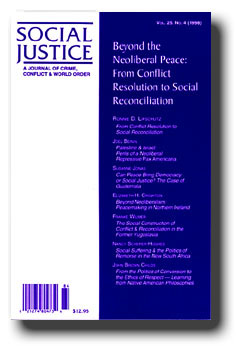![[Currents header graphic]](/homeart/currents_header.gif)
![[Currents header graphic]](/homeart/currents_header.gif)
March 22, 1999

|
It's obvious that political scientist Ronnie Lipschutz and Susanne Jonas of Latin American and Latino studies have worked together a lot.
Despite sometimes differing perspectives, they produce a rich exchange of ideas, which is evident in the current issue of Social Justice: A Journal of Crime, Conflict, and World Order, which they coedited. The volume, "Beyond the Neoliberal Peace: From Conflict Resolution to Social Reconciliation," is a collection of articles by seven contributors, including Lipschutz, Jonas, and UCSC sociology professor John Brown Childs. The collection grew out of a conference held at UCSC in 1997 that was funded by the UC-systemwide Institute on Global Conflict and Cooperation, which is based at UC San Diego.
The contributors critique the dominant model of conflict resolution that has emerged since the end of the Cold War, which they refer to as "the neoliberal peace." In such strife-torn areas as the former Yugoslavia, Northern Ireland, and the Middle East, major international powers have tried to broker peace agreements that end the hostilities, establish a democratic electoral process, and bolster the regional economy.
During a recent meeting in Lipschutz's office at Stevenson College, Lipschutz and Jonas discussed the shortcomings of most externally imposed agreements. The fundamental problem, they agreed, is that such settlements fail to address the economic and social inequalities that underlie regional conflicts.
"The neoliberal model puts a system in place that gives the appearance of justice but which much of the time is not just," said Lipschutz. "Peace settlements may give equitable representation to different political blocs, but they can't alter the economic substructure of a region."
The need for what the editors call "social reconciliation" is apparent in El Salvador, where crime is rampant seven years after a negotiated peace, and in South Africa, where white social and economic power has not been dismantled despite a brokering of political power.
Without reconciliation, peace agreements represent only temporary solutions, said Lipschutz.
"What's needed is almost like group therapy," said Lipschutz, describing the breadth and depth of intervention that he believes is needed. "After World War II, people did live side-by-side in Yugoslavia, so is it possible to address the enmities that caused that relative social stability to break down?"
Some internationally brokered peace agreements flounder because the hostilities haven't ended--for example in the Middle East, noted Jonas. "Others flounder because the terms weren't written well or there is resistance from entrenched groups who have something to lose. What's really hard to find is a settlement that unifies all the different constituencies to move forward in the same direction."
Despite current difficulties, the case of Northern Ireland could turn out to be among the most promising, the editors agreed. A high level of state intervention addressed political and economic inequalities as Northern Ireland entered an economically prosperous era in which Catholics, too, made economic gains.
Lipschutz and Jonas assert that for the most part, the protracted regional conflicts that have emerged since the end of the Cold War have not been based primarily on religious or ethnic differences--although these dimensions contribute to the conflicts. Rather, they are caused primarily by tremendous social gaps.
"You have to look at the distribution of power between groups to see what triggers these conflicts," said Lipschutz. "The causes are really inequities of power and wealth. You have to look at who controls the property and capital."
Jonas, who specializes in the politics of Central and Latin America, wonders whether there will be new tensions and conflicts in those countries, where formerly excluded groups have rising expectations at the end of years--and sometimes decades--of civil war.
In Guatemala, for instance, where a peace agreement was signed two years ago after almost four decades of civil war, "people have expectations now that they never had before," said Jonas. "Significant readjustments of power are supposed to take place, and the indigenous majority is asserting its rights."
She is hopeful that the country will not collapse again into civil strife, although there are other dangers. Guatemalans need only look as far as El Salvador to see what to avoid.
In El Salvador, a conservative government signed a peace agreement with the rebel FMLN seven years ago, but the social structure was left unchanged "in a country where people have been mobilized," said Jonas. The result is a nation torn by the highest incidence of social violence in Latin America, including high rates of poverty, crime, and unemployment.
Although the leftist FMLN has established a strong voting bloc in the El Salvadoran Congress, translating that political power into social change is an enormous challenge, she said.
But Guatemalans did learn some lessons from El Salvador. The Guatemalan peace accord doesn't simply follow the neoliberal model; as written, it mandates changes to the tax system to finance social programs and moderately redistribute resources, said Jonas. Now the big challenge lies in implementing the accord and overcoming resistance from the economic elites, as well as curbing the power of the army.
Both Jonas and Lipschutz found the process of editing the collection challenging and rewarding. It forced both of them to look beyond their own areas of specialization and gave them an opportunity to make comparisons they hadn't previously made.